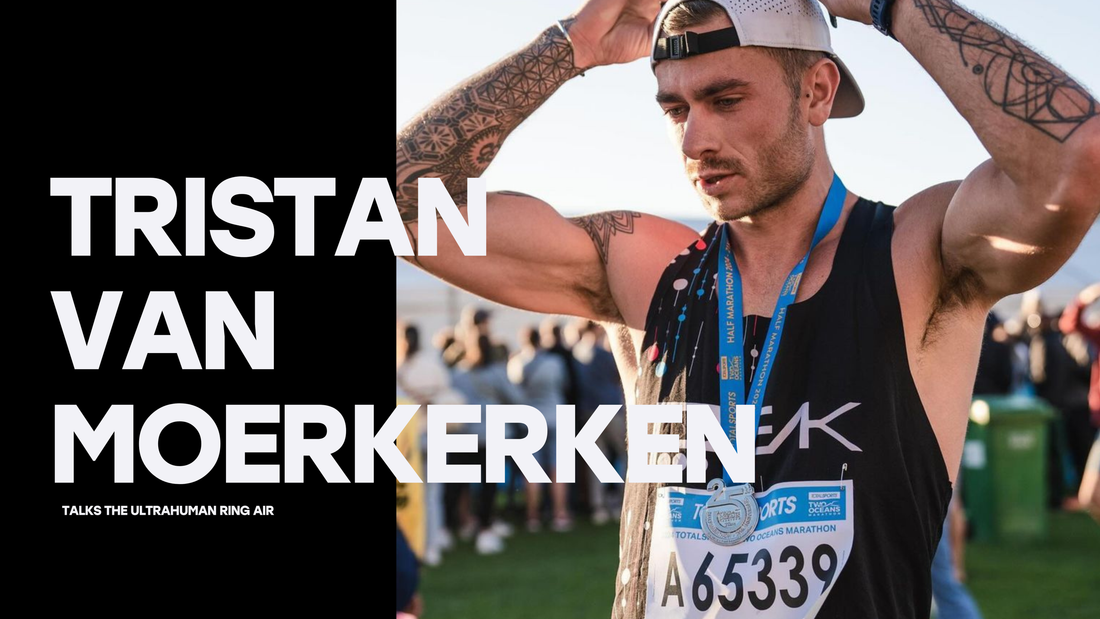
Tristan Van Moerkerken talks the Ultrahuman Ring Air
Share
The Ultra Human Ring: Your Secret Weapon for Amazing Sleep
Let's be real - getting good sleep is hard these days. Between endless work, social commitments, and being glued to our phones, quality rest often gets pushed to the back burner. But lack of sleep can seriously mess with your mood, focus, health and more. That's where the Ultra Human Sleep Tracking Ring comes in clutch.
This nifty little wearable is a total game-changer when it comes to understanding and improving your sleep patterns. We're not just talking basic sleep tracker stuff like duration. The Ultra Human Ring takes things to the next level with advanced metrics like heart rate variability, skin temp, movement tracking, and even glucose monitoring!
What Makes the Ring So Awesome?
- Personalized Coaching, Not Just Numbers Most sleep trackers just vomit data at you without much context. But the Ultra Human Ring actually interprets all those stats and gives you tailored tips to level up your sleep hygiene. It's like having a mini sleep coach on your finger!
- The 360 View of Your Health, Sleep doesn't exist in a vacuum - it's impacted by things like exercise, diet, stress levels and more. This ring connects to other health apps and devices to paint the full picture of how different factors affect your sleep quality. No more guesswork.
- Robust Data, Real Insights Heart rate variability, skin temp fluctuations, overall movement scores - the ring analyses all these metrics and more. This comprehensive data allows for much deeper, more accurate insights into your sleep patterns compared to basic wearables.
The Ring vs. Smartwatches:
Smartwatches have pretty basic sleep-tracking capabilities. The Ultra Human Ring blows those out of the water:
Ultra Human Ring:
- Advanced multi-metric sleep tracking
- Personalised coaching based on your data
- Integrates with other health devices
- Designed specifically for sleep/recovery
- Made for all-night wear
Smartwatches:
- Surface-level sleep stats
- Little customised guidance
- Mostly for activity tracking
- Sleep as an afterthought feature
- Not super comfy for overnight wear
While smartwatches offer basic sleep tracking, the Ultra Human Ring provides a comprehensive solution for optimizing sleep, recovery, and daily health. In addition to advanced sleep analytics, it delivers personalized guidance to improve sleep quality based on your unique data and lifestyle factors. But it doesn't stop there - the ring also tracks daily activity, movement patterns, and biometrics like heart rate variability to gauge recovery status after workouts. This powerful combination allows you to see how sleep impacts other aspects of your health, and vice versa. With in-depth reporting and valuable insights connecting all the dots, the ring serves as an integrated “health coach” for achieving optimal sleep, performance, and overall wellness.
My Experience As someone who's really active and cares about optimal health, this ring has been a total lifesaver for me. I not only get a nightly sleep score, but actually know what factors impacted it and how to improve going forward.
My recovery from training has skyrocketed since using the insights from the ring to tweak my sleep habits. My energy levels throughout the day are consistently higher too. It's like having a little sleep expert on my finger!
If you're looking to truly understand and upgrade your sleep game through data-driven adjustments, the Ultra Human Ring is 100% worth it in my book. Smartwatches are cool for activity stats, but this ring provides way deeper analytics and coaching specifically focused on sleep quality.
Key Factors That Affect Sleep Quality
While the Ultra Human Ring provides personalized insights, there are some common culprits that can disrupt sleep for many people. Here are five that i have identified to have the biggest impact on my sleep & recovery routine:
Stress: High levels of stress and anxiety make it harder to fall and stay asleep. Stress triggers the release of cortisol, which is a stimulant hormone that keeps you alert and awake. Finding ways to manage stress through relaxation techniques can improve sleep.
Light Exposure: Your body's circadian rhythm is heavily influenced by light cues. Too much light exposure in the evening from electronic devices can trick your brain into thinking it's daytime, suppressing melatonin production and sleep onset. Limiting blue light (or screentime) a few hours before bed helps.
Alcohol: While alcohol may help you fall asleep faster initially, it disrupts sleep quality later in the night as it metabolizes, often causing fragmented sleep and early morning awakenings. Avoiding alcohol close to bedtime is best.
Diet: What and when you eat can impact your sleep. Heavy, spicy or sugary foods too close to bedtime may cause discomfort. Caffeine after noon can also interfere with your sleep-wake cycle. A lighter evening meal and trying to eat atleast 2h prior to bedtime promotes better rest.
Exercise: While regular exercise promotes better sleep overall, intense workouts too close to bedtime can be overly stimulating for some people due to increased body temperature and hormones like adrenaline. Aim for morning or afternoon exercise instead.
